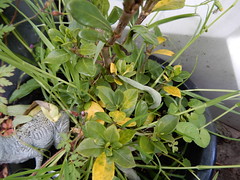I have a birdtable now. I put it in in the dead of winter, like you do, and by summer the sparrows have become impossibly feisty, you've fed at least two of them to the male Sparrow Hawk who (props to him) does an incredible attack run along the front garden bird feeders, they've had an enormous fight with the housemartins, and then in June, the rats start rising, and you think, hmm, maybe I'll stop bird feeding for a few months. But not before the birdseed has got everywhere and this sort of thing is happening in water trays:

Sometimes one has to conclude that there is unhappiness. This little clematis that set up home in a hanging basket, every year it hits the bottom and goes into not-quite-terminal sulk. I don't even know what variety it is. It seeded itself (although I do bring a lot of clematis seeds into the garden, so it may have been present in compost) and has never yet managed to flower. Leaf miner this year. At least something is happy. The miniature Kleim's Hardy Gardenia is a little sadder every time I look at it. Should I feed it? Or will that just hasten its desolate decline? The orange Azalea hates being dry. It also hates being too wet, hates tap water, and hates cold water. It may also hate being too hot? Dusky Orange Abutilon has these leaves, that just look a bit sad. Or maybe they're just patterned that way. It's flowering very well, so I'm nervous about tipping the balance with a feed.




At the beginning of lockdown, I used to run round the garden hoiking out bindweed while waiting for my partner to finish his half an hour on the exercise bike so I could have my go. But then weeks turned into months and I started getting a bit sick of doing that, and there was usually something else to do. It's fair to say that the bindweed has largely won. My Oriental Poppy may have fallen victim. Among other things. It's such a strangler.
I've started rewilding some of my plant pots. Well, to be fair, they started it first; random scrub tree seedlings started growing in the pots after about five years, like a diagram from an old biology test book. I've weeded out some but kept others. This pot, for example, is a great killer of petunia, fuchsia and geraniums. But this little wedge of grass is doing pretty well.


Sometimes one has to conclude that there is unhappiness. This little clematis that set up home in a hanging basket, every year it hits the bottom and goes into not-quite-terminal sulk. I don't even know what variety it is. It seeded itself (although I do bring a lot of clematis seeds into the garden, so it may have been present in compost) and has never yet managed to flower. Leaf miner this year. At least something is happy. The miniature Kleim's Hardy Gardenia is a little sadder every time I look at it. Should I feed it? Or will that just hasten its desolate decline? The orange Azalea hates being dry. It also hates being too wet, hates tap water, and hates cold water. It may also hate being too hot? Dusky Orange Abutilon has these leaves, that just look a bit sad. Or maybe they're just patterned that way. It's flowering very well, so I'm nervous about tipping the balance with a feed.





Months after the first blossom, when most of the fruit was setting, my apple tree had a second flush of blossom. I've put a lot of water on it this year, the nasty cold water that so many of my plants hate. Maybe I kicked it back into spring-mode somehow? Weird, anyway. Also; I didn't get gooseberry saw-fly this year! But I got scale beetle. It's always something with that gooseberry bush.


Finally, a plant that has gone onto my forever list for the garden. Muscari Plumosum. I was very sceptical when I bought it, thinking it would look a bit of a mess. But it actually combines a weird, unearthly beauty with the vigour and toughness of regular Muscari. About the height of a large narcissus, so rather larger than a regular Grape Hyacinth, it was also (improbably) popular with bees and pollen beetles and happily set seed, though how true that will come is anyone's guess (there are always other muscari around the place). I'll rebulb anyway; its worth it.

No comments:
Post a Comment